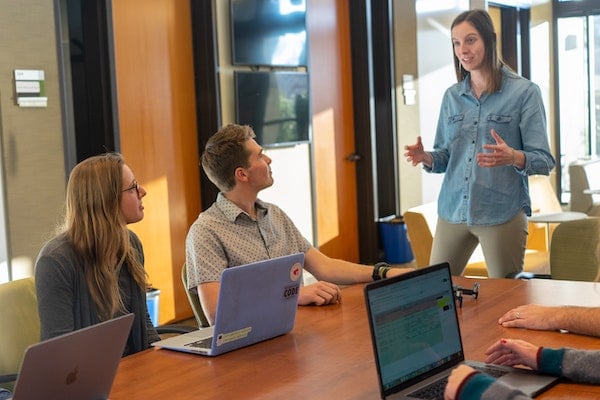Published on
CAEL Microcourses: Putting Our Preaching Into Practice

When you advocate for lifelong learning and meeting adult learners where they are, it’s only fair to subject yourself to the same high standards. After all, actions speak louder than words. And to ensure that those actions are speaking to your stakeholders’ needs, you must start by listening to them. That’s the philosophy behind CAEL’s new series of microcourses, from the initial decision to create them to the listening tours that informed their development to their evolution and future direction.
With bite-sized servings available on demand, microcourses exemplify user-centered learning built for people with demanding schedules. Our iterative design approach aims to help our users as well as our development team. Keeping user needs front and center throughout the design and production cycles helps us maximize relevancy and minimize waste. We want to get the most out of our budget and for our members to get the most out of the time they invest in this new learning resource.
After all, our members tend to be very busy, but they also have a healthy appetite for learning. One thing we repeatedly see in CAEL member survey results is a desire for more professional development resources. In fact, that high level of interest altered our original plan for microcourses. Rather than featuring them solely among the tools and solutions that generate revenue to support our nonprofit mission, we are making them available at no cost to all CAEL members. So, if you haven’t already, I hope you’ll check them out. (The first one is free to the general public.) Here’s the full list:
- Roadmaps to Success: Understanding and serving your adult learners
- Improving Programs with Labor Market Data
- Engaging Adult Learners as Consumers
- Attracting Adults to Your Institution
- Building Blocks for Effective PLA Programs
- Strengthening Employer Partnerships
- Designing Stackable Credentials
- Embedding Experiential Learning in Your Programs
As for how we determined the menu of these bite-sized courses, once again, stakeholders played a key role. I embarked on a lengthy listening tour with stops in virtually every niche of the adult learning ecosystem. I met with provosts and presidents, deans and department chairs. I also heard from faculty and administrators. Each conversation framed a snapshot that our team wove into a comprehensive mosaic framed within the field perspective. They centered on how professional development could best help practitioners uphold adult learning excellence.
To complement these personal accounts, we drew on data from our Adult Learner 360 diagnostic tool to identify areas in which institutions face consistent challenges. As you can surmise from the microcourse topics, we also needed to include the employer and workforce development perspectives. Our experts who specialize in fieldwork within key industry sectors were a great source of information. The recurring issues they help our partners tackle pointed the way to areas of high relevance.
In addition to members and clients, our market research benefited from the wealth of information elsewhere within Strada Education Network. For example, Strada’s Consumer Insights’ Public Viewpoint survey tracks important trends among education and training providers, policymakers, employers, and individual Americans amid the COVID-19 crisis. We also enlisted the help of fellow Strada Education Network affiliate Emsi, which lent its expertise in labor market data.
We also drew plenty of inspiration from other lines of business. Many organizations excel at enriching their members’ experience through professional development. The missing link was applying the specificity of the adult-learning lens. So, we culled best practices, added our primary and secondary research, and put them in a big funnel to look for connection points. The result is our initial lineup of eight microcourses.
One of the things I’m most proud of is the “learning from experience” dynamic these microcourses offer. They put theory into practice by featuring real-world practitioners. Rather than preaching doctrine, the microcourses center on people who have actually experienced the challenges we’re trying to solve.
For example, Columbus State Community College, which has done groundbreaking work in using labor market data to build strong relationships with regional employers, leads segments in course two (as does the aforementioned Emsi). Along similar lines, McDonald’s director of educational strategies shares her expertise in “Strengthening Employer Partnerships.” She is joined by CAEL member institution Bismarck State Community College, which has built a legacy of workforce learning. Several other organizations and institutions are featured. All are stellar examples of effectively executing the best practices each microcourse focuses on.
Looking ahead, the overall program design is much bigger than our initial rollout. But future courses will, once again, be based on our stakeholders’ learning needs. We are intent on maintaining that iterative development model that incorporates the user experience into all aspects of the program. We are tracking usage data to see what’s resonating with course takers. Where there is opportunity to learn from our learners, we will pursue it.
On that note, please let us know what you think of the courses, which members can access here. We’d also love to hear from you about additional areas where on-demand, just-in-time learning can meet you and your colleagues’ professional development needs. You can submit your questions and comments–on our microcourses and any other topic–at caelCONNECT, our online community platform and collaboration hub for members.
As I hope I’ve made clear, we couldn’t have built this program without our members. And we won’t be able to build upon it without them either. So, thank you for making this–and all that we do at CAEL–possible.
Disclaimer: Embedded links in articles don’t represent author endorsement, but aim to provide readers with additional context and service.
Author Perspective: Association



